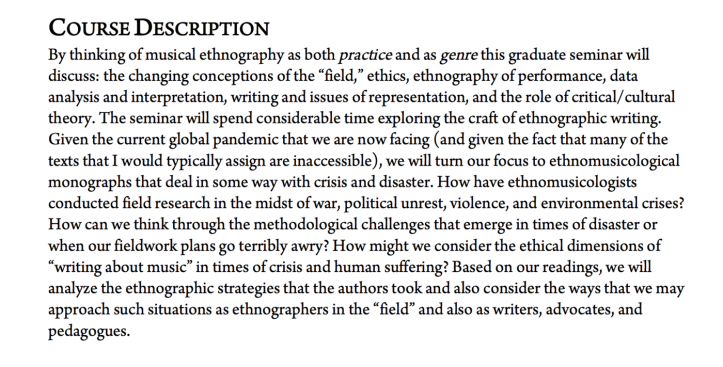Reflections on Pandemic Pedagogy

When UCLA announced on March 13 that we would transition to remote instruction for the entirety of spring quarter, I had to quickly reconceptualize my graduate seminar. Like so many other instructors at my institution and elsewhere, I needed a crash course in the mechanics of online teaching. I also needed to orient myself to issues of accessibility, equity, and inclusion as they applied to students in an online learning environment. Most importantly, I wanted to be mindful of the feelings of anxiety, frustration, confusion, and grief that many of us have had to navigate in the midst of the COVID-19 pandemic and social isolation. In the early spring, we were just entering into a global public health crisis and an economic one, as well. From the outset of the quarter, it was clear that things were not going to be business as usual.
For help, I joined newly formed “pandemic pedagogy groups” and attended webinars led by instructors who design and teach online courses, such as this excellent one on “Equity in Online Teaching” curated by OiYan Poon at Colorado State University. It soon dawned on me that many of our courses and offerings in the School of Music could not transpose so easily into an online modality. Moreover, the announcements of state and city-wide travel restrictions and lockdowns—trickling in day after day—forced instructors to make quick decisions about course content and seek workarounds to library and campus closures. Beyond the basic concerns for the physical and mental health of our students, many other factors had to be assessed in this act of pedagogical triage. Here are a few factors that were on the mind of many instructors at the start of the quarter, and perhaps a few that were not:
• Would students have access to adequate technology and high-speed internet/bandwidth? Would they be accessing course materials or attending Zoom meetings on their smartphones? Would they be sharing computers with other members of their families?
• Now that students were no longer living on campus, would they be in living situations that are conducive to online learning? Would these living situations be safe?
• With schools and day-care programs closed, would some students be juggling child care alongside managing home-schooling?
• Would students living in different time zones be able to participate if instructors insisted on synchronous meetings?
• Would international students face additional challenges (e.g., travel restrictions, quarantine, or future visa issues) upon return to their home countries?
• Would some international students be concerned about freely participating in synchronous Zoom meetings because of state surveillance in certain countries?
• Would instructors still be able to provide adequate support and accommodations for students with disabilities?
• In the case that family members of students were laid off as a result of pandemic-related work/business closures, would universities prepare special emergency funds to assist students?
• In the case that students contracted COVID-19, would they have access to student health care insurance in their new locations?
• Given that COVID-19 is taking a disproportionate toll on Black and Latinx communities, would universities create special support resources for students from these communities?
• Would instructors be able to respond with compassion and flexibility in the case that family members of students became ill or died as a result of COVID-19? Lyra D. Monteiro addresses the difficult, yet very real possibility in this essay.
These are just some of the questions that guided my approach to the transition to remote teaching. After assessing student needs with a questionnaire (adapted from one created by Danya Glabau), I felt that it was important to acknowledge the fact that we are in a pandemic and meet students in this current moment. I made the decision to shorten the time period of the seminar to minimize Zoom fatigue and to allow for asynchronous participation. I adapted a seminar that I have taught several times before, “Musical Ethnography as Practice and Genre,” to have a subtheme of “Ethnography and Crisis.” Here is the course description from the revised syllabus:

We spent the first half of the quarter engaging with core ethnographic issues, and the second half was devoted to reading and analyzing ethnographies (Shelemay, A Song of Longing: An Ethiopian Journey; Silvers, Voices of Drought: The Politics of Music and Environment in Northeastern Brazil; Daughtry, Listening to War: Sound, Music, Trauma, and Survival in Wartime Iraq; and Ndaliko, Necessary Noise: Music, Film, and Charitable Imperialism in the East of Congo). The online format facilitated a special visit by Kay Shelemay in week 5. She was generous in offering her time to answer students’ questions about her book and her ethnographic research in Ethiopia during a time of political upheaval. In the final week of the quarter, students gave presentations on ethnographies of their own choosing.
The shortened seminar sessions forced me to think of strategies to best facilitate discussion of readings in the awkward and imperfect interface of Zoom. Although technology allows us to convene remotely in this pandemic, it also introduces some time lags, glitches, and hurdles that can make spontaneous conversation challenging. Having focused discussions centered on one or two central questions as well as having students read for different elements in an ethnography (and present on them) seemed to work well in our small five-person seminar. And varying the kinds of asynchronous assignments (e.g., sharing of response papers and discussion questions; collaborative work; online discussion threads) was useful, too. Admittedly, these particular strategies will work in some seminars and not in others. Perhaps the best approach may be to solicit student feedback throughout the term and to have a flexible mindset. I anticipate that there will be many more tips, resources, and “best practices” lists that can be consulted in the coming months.
Real life—and the various crises unfolding from week to week—was never far from our minds. Readings on fieldwork ethics and ethnographic issues led naturally to questions about how ethnographic research could be conducted amidst the new realities of the pandemic, lock-downs, travel bans, visa restrictions, and the cancellation of live performances. More questions and anxieties were generated than answers. I started collecting resources that addressed fieldwork in the time of COVID-19, such as this crowd-sourced Google document, edited by Deborah Lupton. During the quarter, our department hosted timely lectures by Liz Przybylski on “Practicing Ethnography in Times of Covid-19: Hybrid Online Offline Methodology” and Maureen Russell on “Accessing Archives in the Age of Covid-19” (Thanks to Anna Morcom, Shannon Garland, and Kathleen Hood for organizing these events, which were part of the Nazir Ali Jairazbhoy Colloquium Series at UCLA.)
In the last two weeks of spring quarter, just as the United States was about to surpass 100,000 deaths from COVID-19, we learned of the brutal murder of George Floyd by Derek Chauvin and three other Minnesota police officers. The killing of yet another unarmed Black man at the knee of a white police officer led to widespread protests in Minnesota and the rest of the United States, expanding worldwide. Floyd’s death occurred not long after the murders of Ahmaud Arbery and Breonna Taylor. In different parts of Los Angeles, protests to condemn police brutality were met with curfews and the use of militaristic force by the police and the National Guard. The protests reignited the Black Lives Matter movement and have gained momentum as part of a larger social movement that addresses racial injustice, systemic racism, and police brutality.
I imagine that it was challenging for many students to maintain focus on final projects and exams in the final two weeks of the quarter. I imagine that the months of uncertainty and social isolation due to the pandemic have taken a toll. I imagine that some of our students felt an urgency to join the protests and the calls for racial justice. I imagine that it was even more difficult for Black, Indigenous, and People of Color (BIPOC), as well as students in other marginalized groups to witness and relive these repeated acts of racial violence. I imagine that many students were filled with even more anxiety than at the start of the quarter. And I imagine that many students have questioned the relevance of some of their courses during this set of interrelated crises that show no signs of abating.
What does the practice of ethnography have to offer us in this particular moment? I reflected on this question before our last seminar meeting and offered a few parting thoughts. I framed my comments in terms of the crises and seismic shifts that we are encountering in our lives, and not in terms of research or the disciplines of ethnomusicology and anthropology. Thinking back to some of the working definitions of ethnography that our seminar brainstormed in our first meeting, I leaned on two in particular: ethnographic method as a form of heightened observation and ethnography as the practice of listening to people’s stories. Paying close attention, bearing witness, and listening closely to people’s stories are relevant and important acts that we can cultivate in these precarious times. These practices, at a basic level, involve habitually training one’s attention to what may ordinarily escape consideration or what may be shrouded in silence, and listening with intention to stories and experiences other than one’s own. One does not need to be a trained ethnographer to develop these practices. But one does need to be intentional and attuned to stories of difference.
On a closing note, I recognize that these practices—while earnest and idealistic—cannot be extricated so cleanly from ethnography and its disciplinary parentage. As the cornerstone of anthropology and ethnomusicology, ethnography (as method and as genre) emerged from colonial histories, racist policies, and structures of inequality. And, as we have been reminded very recently, ethnomusicology’s colonial legacies manage to endure, with the baggage never fully unpacked. The spring quarter may have ended for us, but I will continue to reexamine the question that I posed to my seminar at our last meeting, now especially in light of Dr. Danielle Brown’s powerful open letter on racism in music studies, posted on June 12. There are countless stories of experiences of racism in the academy and our discipline that will never find their way to a public listserv. These stories exist nonetheless. If we as ethnographers enlist those finely-honed skills of paying attention, bearing witness, and listening carefully to some of these stories, I imagine this could be key in taking a step forward towards a discipline and future that is truly anti-racist.
Note: I would like to thank Lucas Avidan, Mathieu Berbiguier, Delaney Ross, Tingting Tang, and Yuzhou Wang for always showing up and for your enthusiastic engagement during this challenging spring quarter.
References
Daughtry, J. Martin. 2015. Listening to War: Sound, Music, Trauma, and Survival in Wartime Iraq. New York: Oxford University Press.
Ndaliko, Chérie Rivers. 2016. Necessary Noise: Music, Film, and Charitable Imperialism in the East of Congo. New York: Oxford University Press.
Silvers, Michael. 2018. Voices of Drought: The Politics of Music and Environment in Northeastern Brazil. Urbana, IL: University of Illinois Press.
Shelemay, Kay Kaufman. [1991] 1994. A Song of Longing: An Ethiopian Journey. Urbana, IL: University of Illinois Press.
Biography
Katherine In-Young Lee is Associate Professor of Ethnomusicology at the UCLA Herb Alpert School of Music. Her research interests include East Asia, Korean music and culture, music and politics, sound studies, ethnography, transnational adoption, and global circulations of form. Her book, Dynamic Korea and Rhythmic Form (Wesleyan 2018) explores how a percussion genre from South Korea (samul nori) became a global music genre. Dynamic Korea received the Béla Bartók Award for Outstanding Ethnomusicology from the ASCAP Foundation Deems Taylor/Virgil Thomson Awards. Her earlier research on the role of music at scenes of protest during South Korea’s democratization movement was recognized with the Charles Seeger Prize by the Society for Ethnomusicology and the Martin Hatch Award by the Society for Asian Music.





